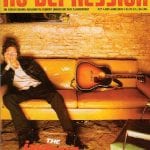Peter Guralnick – People Want To Tell Their Stories
It happens all the time. You read an article in a music magazine, scratch your head and go, “Wait a minute, what does this have to do with the singer or record I thought I was reading about? This says more about the person who wrote the piece than anything else.” To be sure, all writing reveals something about the author as well as the subject. Yet it seems that the focus of more and more music stories isn’t the record or the people who made it, but the critic — clever quips, turns of phrase, what have you.
The work of music historian and biographer Peter Guralnick is a beacon by contrast. Amid the sea of self-referential copy that pervades today’s pop music press — writing that too often trades irony for insight, condescension for communion — Guralnick engages his subjects with respect and, as much as possible, lets them speak for themselves. Through the accretion of assiduously assembled detail, he has, over the past 35 years, brought to life the social, cultural and historical contexts from which some of the greatest country, blues, soul, and rock ‘n’ roll records have emerged.
Guralnick’s definitive biographies of Elvis Presley, Last Train To Memphis and Careless Love, are perhaps the most celebrated examples of his work. But in some respects, his roots-music triptych — Feel Like Going Home, Lost Highway, and Sweet Soul Music — remains his signal achievement, if only for its scope and for the way it fuses a fan’s enthusiasm with the perspicacity of a scholar. The three books, which originally appeared in 1971, 1979 and 1986, respectively, have been recently reissued by Little, Brown.
Guralnick harbors no illusions about the extent to which his values shape his narratives. He knows that even the smallest decisions about what to include in or leave out of his accounts entail editorial judgments. But by endeavoring to remove everything that might come between his readers and the people and events he’s writing about — even to the point of stripping away excess color from his language — Guralnick enables us to feel as though we’re right there with the likes of Howlin’ Wolf, Solomon Burke and Elvis Presley without reminding us that he’s there as well.
There’s little glory in this approach, and it’s painstaking as hell, as Guralnick’s protracted accounts of conflicting reports about what Elvis ate for lunch at one point attest. Guralnick’s commitment to getting to the bottom of things does, however, testify to his belief that even seeming trivialities can reveal something — and that his subject and his readers matter enough for him to get the story straight.
Granted, it’s a romantic, even quixotic, approach. And it sure ain’t cool by new journalism standards. But ultimately it bespeaks a nobility rarely glimpsed in the work of showier, less self-effacing, and less scrupulous writers.
I. I’M INTERESTED IN NEITHER GENTRIFICATION NOR GENREFICATION
NO DEPRESSION: What do you see as the unifying element in your work, or among the various people you’ve written about over the years (other than the fact that they’re musicians)?
PETER GURALNICK: I don’t think I could have articulated it this way when I first started writing, but I’ve come to see it as a continuum of great American vernacular music. It’s one of the most significant cultural contributions that America has made to the world, and to this day it doesn’t get the recognition it deserves.
I see this panoply of talent, and what ties it together for me is passion and commitment. It always comes down to matters of individual taste, I suppose. Somebody else might say, “What do you hear in Ernest Tubb?” But I hear in Ernest Tubb the same kind of thing I hear in Bill Monroe.
It’s not genre. I’m interested in neither gentrification nor genrefication. [laughs.] Whether it’s Elvis or Bobby “Blue” Bland or Merle Haggard, it’s a sense of depth or feeling that I’m looking for. And that’s not ruled out by sophistication, because Charlie Rich was a very sophisticated musician. Bobby Bland’s arrangements are very considered arrangements. But if they were merely used to advance a kind of sterile music, it wouldn’t interest me.
So when people ask me, for instance, “If you’re looking for soul music, what are you listening to today,” I would point to something like Nick Lowe’s last two albums. Not because they replicate the genre. They don’t replicate the feeling, they achieve the feeling. They’re deep, soulful albums.
If somebody said, “Well, is there anybody in the world today like Howlin’ Wolf,” I’d say, “Yeah, Billy Joe Shaver.” Obviously this is across genres, and there’s no comparison with the voice, but when you went to see Howlin’ Wolf, you got Howlin’ Wolf as he was, pure and unadorned — unvarnished. This was the raw truth, and for me it’s the same thing with Billy Joe Shaver.
ND: You seem to have a real connection to your subjects, something that transcends the fact that they make music that falls within this roots music continuum. What do you suppose that connection is?
PG: I’ve never written about anyone in whose music I don’t believe. I’ve never written on assignment. Every subject I’ve ever written about I’ve chosen out of admiration for the person’s work or for the person himself. So the point is I never leave my subject. I’m no less interested in Muddy Waters today than I was when I first wrote about him in 1965.




